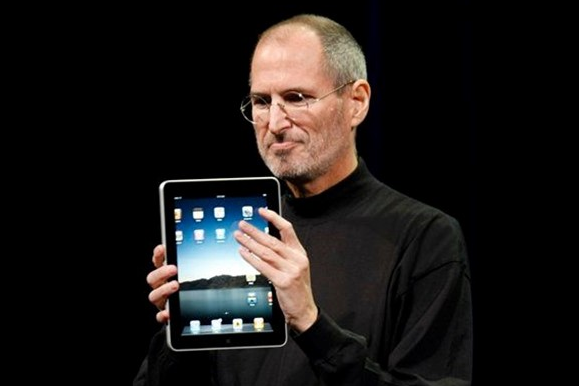To underscore the casual nature of the iPad, Jobs ambled over to a comfortable leather chair and side table
為了強(qiáng)調(diào)iPad的親和性,喬布斯從容地走到一把舒適的皮革椅子和一張邊桌前,拿起了一臺(tái)iPad,
(actually, given his taste, it was a Le Corbusier chair and an Eero Saarinen table) and scooped one up.
實(shí)際上,出于他的品位,椅子是勒·柯布西耶設(shè)計(jì)的,邊桌則是埃羅·沙里寧的作品。
"It's so much more intimate than a laptop," he enthused.
他熱情地說(shuō):“它比筆記本電腦親和得多。”
He proceeded to surf to the New York Times website, send an email to Scott Forstall and Phil Schiller ("Wow, we really are announcing the iPad"),
接著,喬布斯開(kāi)始瀏覽《紐約時(shí)報(bào)》的網(wǎng)頁(yè),給斯科特·福斯托和菲爾·席勒發(fā)送電子郵件,題目是“哇,我們真的在發(fā)布iPad。”
flip through a photo album, use a calendar, zoom in on the Eiffel Tower on Google Maps, watch some video clips (Star Trek and Pixar's Up),
然后他翻閱相冊(cè),使用日歷,在Google地圖上放大埃菲爾鐵塔的圖片,觀看了《星際迷航》和皮克斯《飛屋環(huán)游記》的一些視頻片段,
show off the iBook shelf, and play a song (Bob Dylan's "Like a Rolling Stone," which he had played at the iPhone launch).
展示iBook書(shū)架,并播放了鮑勃·迪倫的《像一塊滾石》,這首歌他曾在iPhone發(fā)布時(shí)播放過(guò)。
"Isn't that awesome?" he asked.
“這難道還不夠牛嗎?”他問(wèn)道。
With his final slide, Jobs emphasized one of the themes of his life,
在最后一張幻燈片中,喬布斯著重闡述了其人生的一個(gè)理念,
which was embodied by the iPad: a sign showing the corner of Technology Street and Liberal Arts Street.
這一理念也在iPad身上得到了體現(xiàn):一個(gè)路牌上標(biāo)識(shí)著“科技”與“人文”兩條街的交匯口。

"The reason Apple can create products like the iPad is that we've always tried to be at the intersection of technology and liberal arts," he concluded.
“蘋(píng)果之所以能夠創(chuàng)造出iPad這樣的產(chǎn)品,是因?yàn)槲覀円恢迸θ诤峡萍己腿宋乃囆g(shù)。”他總結(jié)道。
The iPad was the digital reincarnation of the Whole Earth Catalog, the place where creativity met tools for living.
iPad是《全球概覽》的電子化身,在這里,創(chuàng)意與實(shí)用工具相遇。
For once, the initial reaction was not a Hallelujah Chorus.
但iPad最初收到的反應(yīng)并非頌歌。
The iPad was not yet available (it would go on sale in April), and some who watched Jobs's demo were not quite sure what it was. An iPhone on steroids?
由于產(chǎn)品同年4月才上市,觀看過(guò)喬布斯演示的一些人不太清楚這到底是什么東西。一個(gè)增強(qiáng)型iPhone?
"I haven't been this let down since Snooki hooked up with The Situation," wrote Newsweek's Daniel Lyons
《新聞周刊》的丹尼爾·萊昂斯寫(xiě)道:“自從Snooki和The Situation好上之后,我還沒(méi)有如此失望過(guò)。”
(who moonlighted as "The Fake Steve Jobs" in an online parody).
萊昂斯曾在一個(gè)網(wǎng)絡(luò)模仿秀中扮演“假史蒂夫·喬布斯”。
Gizmodo ran a contributor's piece headlined "Eight Things That Suck about the iPad" (no multitasking, no cameras, no Flash... ).
Gizmodo網(wǎng)站發(fā)表了一篇撰稿人文章,題為“iPad的八大遜處”,列舉出iPad的種種缺點(diǎn):沒(méi)有多任務(wù),沒(méi)有攝像頭,不支持Flash等等。
Even the name came in for ridicule in the blogosphere, with snarky comments about feminine hygiene products and maxi pads.
甚至就連iPad的名字也遭到博客圈的調(diào)侃,被惡搞成女性衛(wèi)生用品。
The hashtag "#iTampon" was the number-three trending topic on Twitter that day.
當(dāng)天,“#iTamPon”這個(gè)標(biāo)簽在Twitter話題榜上排名第三。












